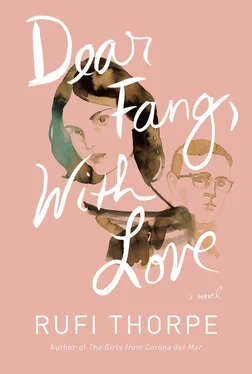“Yes, Western medicine is probably entirely a fraud perpetrated by the drug companies and most people could heal themselves by eating dandelion greens.”
My mother had been hot with rage on the phone, wanting to talk about my betrayal, about how hurt she had been by my disappearance, but I couldn’t even take it in, I just kept saying: “Kat needs prenatal care. She needs to be with her parents. I need to get a job. We can’t stay here, Mom. It isn’t safe here. Please help. I know I fucked up, but please help.”
My mother had flown out that very night and arrived in the morning in a rented Ford Taurus to return the cursing, spitting, wrathful Katya to her parents. Everyone in my life assured me I had done the right thing. But of course I also worried that I was nothing but a coward, so scared of myself, scared that I had fucked a child, that I gave up knowing my own.
Throughout my life, a sort of flickering ghost hovered, a mirage of who I might have been had I stayed there with Kat on that farm. Who I would have become instead of myself.
—
The first time I met Vera, she was already four years old. Katya agreed to have breakfast with me at an IHop so that I could finally meet my daughter. I brought with me to this meeting a pale purple teddy bear. It was winter in California and it was lightly raining, and the bear’s fur had gotten wet on the walk from my car, and the toy looked exactly like what it was: a bribe, too late and not enough. Vera was shy in a way that I know now was perfectly normal for a four-year-old, but which at the time I found devastating. Our meal was short — it is impossible to have a protracted meal at an IHop, anyway. I had never been around kids. I had no idea how to engage Vera. Katya pointedly did not help and would only murmur things to the girl in Russian. The breakfast experience was so awful that I didn’t ask Katya to see Vera again for seven years. The whole thing lasted maybe half an hour.
One thing that went wrong with that morning was that I was hungover. I was almost always hungover in those days, it is true, but I had not intended to be hungover that morning. I was in my senior year at Reed College in Oregon and this visit was happening on one of my trips home to California, specifically my Christmas break, and the night before had been New Year’s Eve. My mother and I and some asshole she was dating named Jerry had gotten wrecked drunk at a Hawaiian-themed bar that served oversize hamburgers. I had not understood heading into the night that it was going to be so insane. Who knew middle-aged people even liked to drink that much? Who could have imagined my mother would wear a plastic lei and begin dancing barefoot on the bench of our booth before being asked to stop by the management? Jerry was footing the bill so the drinks just kept coming, and it was the first New Year’s I had spent legally able to drink so I may have gotten carried away.
But I had not anticipated any of that, and so it had not seemed unreasonable to agree to this New Year’s Day breakfast date with Katya and Vera. In a way, it had even seemed appropriate to me: A new year was beginning, a new era of my life in which I would be a father. This misconception seemed laughable and bitterly ironic as I drove, squinting in the glare between rain clouds, to the IHop where I was to meet my daughter for the first time, sad purple bear in tow.
Katya was living with her parents in LA by then, surrounded by a nest of extended family and Russian Jewish émigrés who made that city home. Her mother watched little Vera while Katya took classes at UCLA, slowly reclaiming her life after our time on the farm and her ensuing pregnancy had derailed everything, causing her to defer and then ultimately give up her admission to Brown. Needless to say, her parents hated me. Katya hated me, too. For calling my mother to come get us. For bringing her back to her parents. For not believing in our love, and worse, for not telling her that I was having second thoughts myself but allowing my mother to do the talking for me. I never talked to her about the night with Chloe, never tried to put into words the wrongness of it, in part because I already knew she couldn’t see whatever it was I saw. There was some insult to Kat in the fact that I saw Chloe as a victim, because really, what was the difference between Kat and Chloe? A few years?
But I think Kat also hated me for going ahead with my own plans. I was the guy, and so I got off relatively scot-free. In my defense, at the time I made the decision to go to Reed as planned, she wasn’t speaking to me at all, refused to see me. It didn’t seem there was much point in sticking around and giving up college in the hopes that she would change her mind. I had already been accepted by Reed the previous year, and so actually going was the path of least resistance. I never did see Kat fully pregnant, belly swollen and round. I didn’t see Vera as a baby, only pictures. Our parents hashed out a child-support agreement and that was that. None of this was done in court — my name wasn’t even on the birth certificate. Katya had insisted on leaving it blank.
Sometimes I would get drunk and heartsick at Reed and write Kat long, incoherent e-mails about how much I loved her and how sorry I was. I would try to bring up fun times we had at Exeter, remind her of our inside jokes, call her by the pet names I used to then, my Rusalka, Russian for mermaid, or the more peculiar “Cabbage Face” that had come from a joke about how weird the French were. Most of the time, she did not respond, but sometimes she sent me e-mails with no words, just pictures of our daughter. Vera was so beautiful it was crushing. There was nothing Katya could have done that would have made me feel worse. I could not even write back, so ashamed did I feel, and I would resolve to leave them alone, since that was what Kat seemed to want, what her parents told my mother she wanted, what she herself told me once, in the very beginning, in a long handwritten letter that she sent just after Vera was born.
But time would pass and I would long for them. They were a secret I had. I didn’t tell everybody I met in college that I had a child. I didn’t even tell some of the girls who were my girlfriends. I didn’t actually consider those girls my girlfriends because I imagined that I was wedded to Katya in some awful, eternal way. The territory of my body and soul belonged to Katya still. Katya and Vera began to live in my consciousness in the same invisible space Grandma Sylvia inhabited, in the gas chambers of my imagination. At night I would scroll through Vera’s baby pictures to torture myself. Vera on a sheepskin blanket, a chubby dumpling of a baby, naked except for a diaper. Vera on Kat’s mother’s lap, looking serious and jowly. Vera looking mistrustfully at a cooking spoon. Vera laughing on a swing, a yellow barrette in her dark hair. Her beauty was the beauty of all children everywhere, the beauty of youth itself, of life, of flowers, of perfect cells newly divided.
I was so caught up in this, in my own martyred suffering, in images of the two of them as eternal archetypes, that I did not spend a lot of time wondering what life was like for Katya. Did she enjoy being a mother? Was it hard? Did the baby keep her up all night crying, or did they sleep together peacefully, the bassinet beside her bed? Did she like her coursework at UCLA? Did she regret not going to Brown? Did it chafe, having to live with her parents after failing to achieve their dreams for her? I did not think about any of these things at the time, though now they seem like the only questions.
Probably, things were grim for Kat in those years of Vera’s early childhood. Kat’s father, Pavel, was a fat and pouty man with unpredictable moods and fairly conservative values. He had gotten his family out of the USSR in the 1980s when Jews could request visas to move to Israel, and from Jerusalem they had rerouted to LA where he had opened a coin and autograph-memorabilia shop that did quite well. He had an innate gift for telling when something was authentic just by touching it, a sixth sense that people in collectibles claimed was real. He was a believer in America, in capitalism, and he wanted his children to have everything. Katya was the eldest and he had sent her to Exeter, paid through the nose for four years, and then she had come home pregnant. Luckily, or perhaps unluckily, Kat’s little sister, Tamara, was better able to live up to their parents’ expectations, attending the University of Chicago for a degree in business. I imagine this created something of a divide between the sisters. Certainly it meant that Tamara was not around much during those first years when Kat was a young mother. I realize now that Kat must have been very lonely.
Читать дальше












